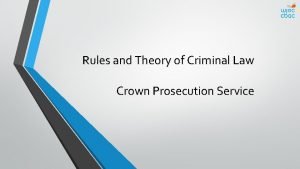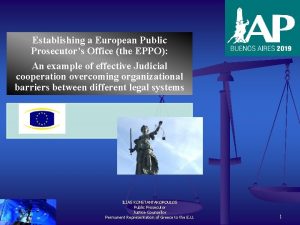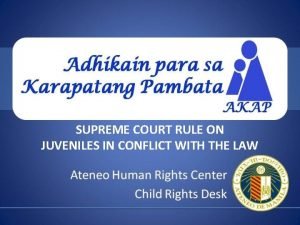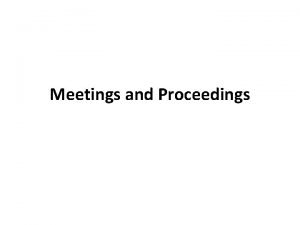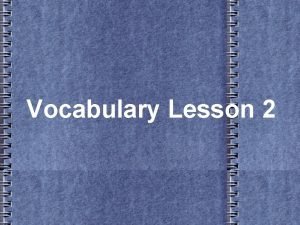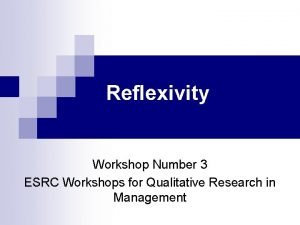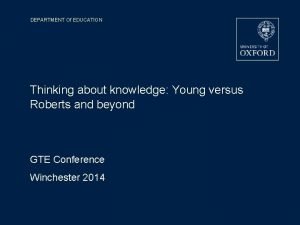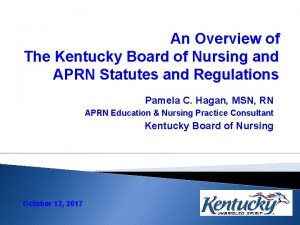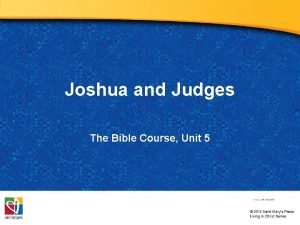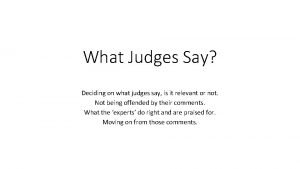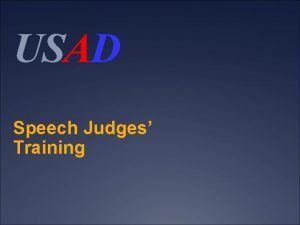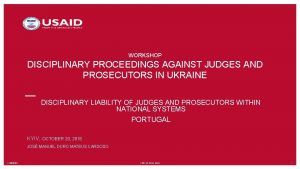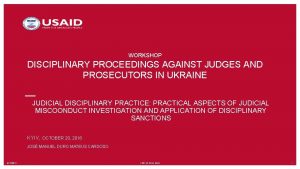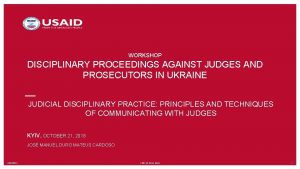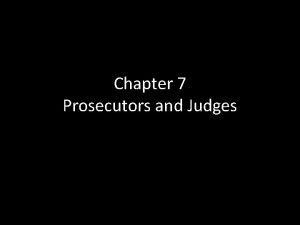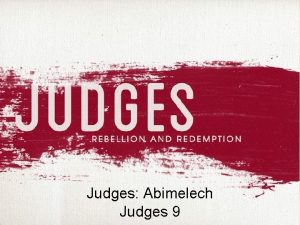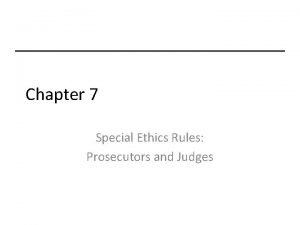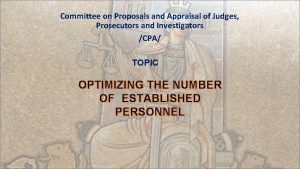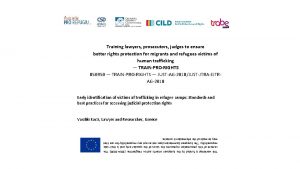WORKSHOP DISCIPLINARY PROCEEDINGS AGAINST JUDGES AND PROSECUTORS IN
















- Slides: 16

WORKSHOP DISCIPLINARY PROCEEDINGS AGAINST JUDGES AND PROSECUTORS IN UKRAINE JUDICIAL DISCIPLINARY PRACTICE: PRACTICAL ASPECTS OF JUDICIAL MISCOONDUCT INVESTIGATION AND APPLICATION OF DISCIPLINARY SANCTIONS KYIV, OCTOBER 20, 2018 JOSÉ MANUEL DURO MATEUS CARDOSO 9/2/2021`1 FOOTER GOES HERE 1

2 JUDICIAL DISCIPLINARY PRACTICE: PRACTICAL ASPECTS OF JUDICIAL MISCOONDUCT INVESTIGATION AND APPLICATION OF DISCIPLINARY SANCTIONS

3 - The goal of Judicial Inspection q q Assess complaints of misconduct against judges by investigative actions. Seek the truth through collecting all evidence possible, whether they lead to the opening of a disciplinary proceeding or a refusal to open a disciplinary case.

4 - Initiation of Investigation Planning A summary of the complaint; A timetable; The alleged misconduct(s); Type of planned activities; And a list of persons to be called for interview.

5 - Preparation for document collection and interviews Preparation shall also include reviewing the HCJ database for other investigations that have been opened and closed on the particular judge. A review of HCJ files may reveal: v The conduct has actually been previously reported to HCJ, investigated and closed and, without new evidence being provided, a new investigation would not be appropriate. v The judge may have already been disciplined for similar conduct.

6 - Organization Organized files promote efficient investigation, saves time in locating documents or statements, saves time in preparing for interviews and in preparing the Draft Conclusion for submission to the respective member of HCJ.

7 - Investigation Strategy Every investigation is a different one. General means open to the Judicial Inspector: v Inspect court files and case files; v Collect documents; v Interview v Seek witnesses; an oral or written response from the judge.

8 - Contact with judge under investigation Written response. Benefits of written response: v There is no need to travel to remote locations for what would likely be a short interview; v It may be more convenient for the judge because they can respond without having to interrupt their work schedule; v If the response is not complete or requires a clarification, an interview can still be scheduled; v The subject of the investigation signs the written response. They then cannot claim later before the HCJ, that they were “misquoted” or their statement was “misinterpreted”.

9 - Personal contact with the judge Typically, the responsible Inspector contacts the judge under investigation and carry out the interviews. Exceptionally, when the judge under investigation is already aware that the investigation is underway, the responsible Inspector may contact the subject under investigation by phone in order to possibly clarify minor uncertainties or technical details or submit in writing by fax to the court where the subject under investigation works.

10 - Interviews Recommended order of priority for interviews: v Complainant; v Voluntary witnesses identified by the complainant; v Judicial staff likely to have information related to the subject matter of the complaint; v Extra-judicial government witnesses; v Private persons; v The judge subject of the investigation v Witnesses proposed by the judge subject of the investigation

11 - Interviewing witnesses Prepare questions for the interviewee before the conversation, applying the rule of first asking general then concrete questions. When conducting an interview, a Judicial Inspector shall always respect an interviewee’s dignity and professional status. Judicial Inspectors shall refrain from raising their voices, using offensive language, and/or exhibiting aggressive behavior during the interview.

12 - Interviewing witnesses Inspectors shall use formal speech throughout the interview addressing interviewees by their family names or positions. The interviewee shall be given the opportunity to speak and to render information in his/her own words and without unnecessary interruptions.

13 - Interviewing witnesses Request detailed descriptions of the conduct in question. Use the “W 5” principle by asking Who, What, Where, Why and When questions. Ask open-ended questions, don´t provide help for an answer. Identify other possible witnesses. Control the interview.

14 - Obtaining documents The Inspector must consider collecting all forms of physical or documentary evidence when conducting an investigation, always protecting its confidentiality. Court documents such as indictments, transcripts, and certificates of service of court documents on the parties. Bank statements, telephone records, calendars or day timers with handwritten notes on them, statements given to other investigative agencies or government ministries who undertake their own internal investigations are some other documents that may provide relevant information.

15 - Applications of Sanctions Only final decisions can be executed. Important role of the inspectors regarding the execution of penalties in the form of temporary suspension and transfer to a lower-level court. For very severe sanctions, a mere written communication from the HCJ may be not adequate The enforcement of the suspension or of the transfer to a lower-level court must be done ensuring the safeguarding of personal and professional dignity of the judge.

Thank you very much for your attention
 Code for crown prosecutors
Code for crown prosecutors European delegated prosecutors
European delegated prosecutors Ra 9344 cases
Ra 9344 cases Meeting adjournment
Meeting adjournment To stop proceedings temporarily; move to another place
To stop proceedings temporarily; move to another place Divorce process in india
Divorce process in india Disciplinary reflexivity
Disciplinary reflexivity Disciplinary record higher pe
Disciplinary record higher pe Disciplinary knowledge
Disciplinary knowledge Disciplinary curriculum
Disciplinary curriculum Disciplinary literacy in physical education
Disciplinary literacy in physical education Capa-cs collaborative agreement
Capa-cs collaborative agreement Frisk documentation model
Frisk documentation model Uta disciplinary probation
Uta disciplinary probation Judges cycle
Judges cycle Things judges say
Things judges say Thank you speech for judges
Thank you speech for judges
